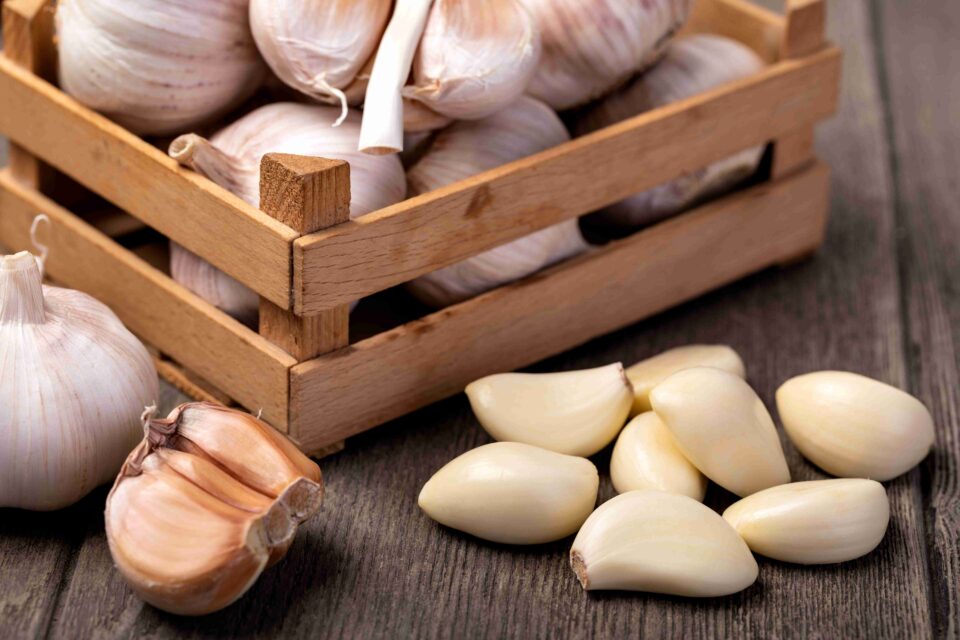‘Is garlic good or bad for kidney disease?’ Many patients suffering from kidney disease ask me this question.
Garlic, popularly known as a culinary flavoring agent, is a healing herb used in most Indian meals. It is loaded with antioxidant, anti-bacterial, and anti-inflammatory properties that can help keep your kidneys healthy and prevent kidney damage.
Studies say that garlic contains a compound called allicin which is beneficial in treating chronic kidney diseases. Garlic also possesses diuretic properties that can help in promoting kidney health. This aids in removing toxins and excess minerals through urination.
Garlic for kidney disease – Benefits
Garlic can protect your blood vessels
High blood pressure and diabetes are the major causes of kidney damage. High blood pressure or diabetes can damage the blood vessels in the kidney, thus, impacting their function. The antioxidant properties of garlic can help reduce oxidative stress, improve blood flow, and prevent your blood vessels.
Garlic for kidney infection
Several studies have shown that garlic has potent anti-bacterial properties. This makes garlic an effective remedy for treating kidney infections, urinary tract infections, and other bacterial infections. Its anti-inflammatory properties can help in treating inflamed kidneys.
Garlic is rich in antioxidants
Antioxidants help fight free radicals, reverse cell damage, reduce oxidative stress, and help our kidney function well. Thus, adding garlic to your daily diet can help in fighting against chronic diseases like cancer and heart disease.
Garlic combats Blood Pressure and Cardiovascular diseases
Cardiovascular disease is the number one killer in the world. It is also a leading cause of death in those with chronic kidney disease. Garlic can help regulate your blood pressure and cholesterol. It also reduces the risk of heart disease.
How to eat garlic?
Eating raw garlic is considered very beneficial because it has more antioxidant activity than cooked garlic. Fermented garlic too is super high in antioxidants. You can either chew a few cloves of raw garlic in the morning or add it to your salads or bread. You can also add garlic to your pulses, rice, vegetables, and curries.
How garlic can be bad for kidney disease?
Several studies have shown that garlic is safe for kidney patients. It has numerous health benefits and does not pose any health risks. However, you must make sure to avoid items high in salt like garlic powder or garlic salt.
Also, note that garlic should be consumed in moderation. Excess consumption of garlic can cause bloating, digestive issues, or bad breath. In addition to this, garlic may not be suitable for all:
People with IBS
If you are struggling with IBS and other gastrointestinal issues then you may limit your garlic intake. The usual symptoms of IBS are – acute abdominal pain, constipation, diarrhea, and other gastrointestinal issues.
Garlic has potassium
Garlic contains potassium, which is not recommended in patients suffering from chronic kidney disease. Thus, you must always take garlic in moderation.
Other foods good for your kidneys
Onions: Onions are low in potassium and rich in flavonoids that can reduce heart disease and protect against cancer. It further improves the body’s ability to metabolize carbohydrates, fats, and proteins.
Red bell peppers: Red bell peppers are also low in potassium and high in fiber. They are also a great source of vitamin C, vitamin A, vitamin B6, and folic acid.
Blueberries: Often considered a superfood, blueberries are rich in antioxidants, fiber, and vitamin C.
Your Takeaway!
Our kidneys are responsible for eliminating wastes and extra fluid from the body. If our kidneys do not function well, then it can result in the accumulation of hazardous amounts of fluid, electrolytes, and wastes. This can lead to chronic kidney diseases.
Eating the right diet can play a crucial role in preventing kidney diseases. Consuming a low-protein diet, limiting salt intake, reducing phosphorus-rich foods, and choosing potassium-low foods can help. In addition to this, eating 2-3 raw garlic cloves every morning on an empty stomach can help your kidneys function well
Many of my patients find it difficult to eat raw garlic because of its strong smell and flavor. In that case, you can add garlic to your rotis, bread, or salads. Just make sure to keep a count of the number of garlic cloves you are consuming in a day.

